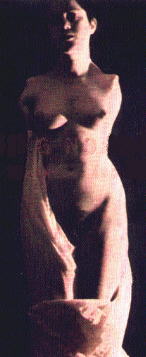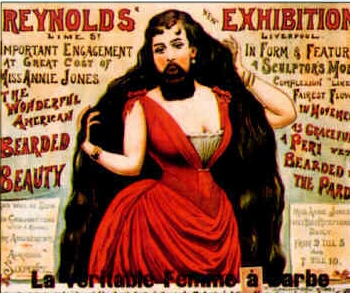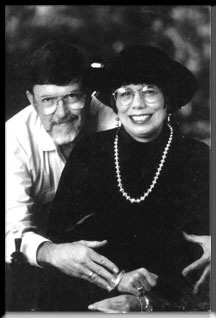Serendip is an independent site partnering with faculty at multiple colleges and universities around the world. Happy exploring!
Notes Toward Day 14: Intersections, Overlaps, Collisions
Day 14: Intersections, Overlaps, Collisions
I. Coursekeeping
--naming
--mid-semester evals:
cantaloupe: let's be reckless, offensive, and offended
cristina: let's meet outside of class
sign-up for conferences about essay
--next week's assignments
the first chapter of Eli Clare's Exile and Pride is now posted on the ~annedalke page.
For Tuesday:
We'll discuss Rosemarie Garland-Thomson's essay "Seeing the Disabled"
If possible, view the 30-minute film "Self-Preservation: The Art of Riva Lehrer" (I'll put it on reserve in Canaday)
Put some images or clips on the forum
2 Events Tonight:
Eric Drooker, the American Book Award-winning author of Flood! A Novel in Pictures, Blood Song: A Silent Ballad, and Illuminated Poems, a collaboration with poet Allen Ginsberg, will be presenting a "musical slide lecture" as the opening keynote address for the symposium on Thursday, October 22, 2009 at 7:30 in Sharpless Auditorium at Haverford CollegeII. Some thoughts about language
rae: by the way, i guess i don't really care about political correctness for its own sake, but i do care about not being offensive, so is "disabled" okay to say? is "differently abled" too unnecessarily PC? what term should i be using?
cantaloupe: Rae commented about the PCness of calling someone disabled and it struck me as kind of funny. Society (and maybe our class as well) is so worried about offending people. I really like that disabled people are reclaiming the term crip. The ability for a word to be offensive is made by the people who decide it's offensive. If disabled people decide crip is no longer a derogatory term, then it isn't. It's like how gay women reclaimed dyke.
kjmason: I think a possible solution would be calling each other out in class, or in the forum when we think we are being overly PC. Not as a personal criticism, but rather as an attempt to elevate the discussion in the course.
terrible2s:I also find it so interesting how many shrouds of taboos and stigmas we have to get around to talk about this stuff. Can I say that I love the term "Crip"?
dshetterly:In the [South Park] episode, Jimmy and Timmy try to start their own group for crippled people which they call "The Crips" they later find out that there is already a group called The Crips and end up joining the gang.
Kristin: Krip Hop! (to distinguish it from Crip Hop) Disability Studies Lecture Series: Krip-Hop Nation: Disability in African American Music. Time: 12PM. Location: Temple University Main Campus
kayla: I remember a passage I really loved in the book [Exile and Pride]: "Disabled. The car stalled in the left lane of traffic is disabled. Or alternatively, the broad stairs curving into a public building disable the man in the wheelchair. That word used as a noun (the disabled or the people with disabilities), and adjective (disabled people), a verb (the accident disabled her): in all its forms it means "unable," but where does our inability lie? Are our bodies like stalled cars? Or does disability live in the social and physical environment, in the stairs that have no accompanying ramp?" (Page 67). He goes on later to say that he understands his relationship to words like these: handicapped, disabled, cripple, gimp, retard, differently abled.
skindeep: like a lot of other people, im still playing with the word 'disability'. is someone dealing with depression/schizophrenia disabled? am i disabled in india/the world because im a girl? do i become further disabled if i decide to identify as gender varient? is there anything like further diabled? or are you just disabled - without any degrees.
A definition of "cripping:
"... to resist the negative interpellations of being queer or crippled (not to mention queer and crippled), members of both groups have developed a wry critique of hegemonic norms. In queer communities, the application of this critique has been given its own verb: to queer. Queering describes the practices of putting a spin on mainstream representations to reveal latent queer subtexts; of appropriating a representation for one's own purposes, forcing it to signify differently; or of deconstructing a representation's heterosexism. Similarly, some disabled people practice "cripping." Cripping spins mainstream representations or practices to reveal able-bodied assumptions and exclusionary effects. Both queering and cripping expose the arbitrary delineation between normal and defective and the negative social ramifications of attempts to homogenize humanity, and both disarm what is painful with wicked humor, including camp."
Carrie Sandahl, "Queering The Crip Or Cripping The Queer?:Intersections of Queer and Crip Identities in Solo Autobiographical Performance." GLQ: A Journal of Lesbian and Gay Studies 9.1-2 (2003) 25-56.
III. impairment/ disability in relation to sex/gender
or: why learn about disability in a gender & sexuality studies course?
Some images, ideas, and quotations to get us started:
"To be female and disabled is to be seen as not quite a woman; to be male and disabled is to be seen as not quite a man. The mannerisms that help define gender—the ways in which people walk, swing their hips, gesture with their hands, move their mouths and eyes as they talk, take up space with their bodies—are all based upon how nondisabled people move. A woman who walks with crutches does not walk like a "woman"; a man who uses a wheelchair and a ventilator does not move like a "man." The construction of gender depends not only upon the male body and female body, but also upon the nondisabled body" (Eli Clare).
"The point of such a dialogue [between disability theory and feminism] is to take responsibility for understanding how bodies--marked by gender and by disability, by impairment and sex, among other things--are formed in, created by, and acted upon by society, and also act within and impact society"(67).
"Feminist disability theory addresses such broad feminist concerns as the unity of the category woman, the status of the lived body, the politics of appearance, the medicalization of the body, the privilege of normalcy, multiculturalism, sexuality, the social construction of identity, and the commitment to integration. . . Disability--like gender--is a concept that pervades all aspects of culture: its structuring institutions, social identities, cultural practices, political positions, historical communities, and the shared human experience of embodiment (75-6).
 |
 |
left: Mary Duffy
center: Venus de Milo
right: "Alison Lapper Pregnant" in Trafalgar Square
"[Feminist art historian] Lynda Nead. . . points out that 'more than any other tradition, the female nude connotes 'Art.' And in that tradition, the Venus becomes the vortex for thinking about the female body. The Venus is, rather than a subject, a masculine way of fashioning the female body, or of remaking it into a conceptual whole" (Davis, 133).

Riva Lehrer, self-portrait
"There's so much going on in that middle section" Tekki Lomnicki in "Self-Preservation"
Some models for thinking gender/disability:
Analogy, Doubling, Hierarchy, Interaction
1) Analogy: Differences of gender and sexuality operate much like differences of physical/cognitive ability. Feminist and gender theory operates much like disability theory--both attend to embodied experience and sociocultural difference.
How might gender/disability identities or theories--or the fields of G&S studies and disability studies--be analogous? Where does the analogy break down?
Beyond analogy:"Women in sexist society are physically handicapped" (153). Iris Marion Young, Throwing Like a Girl and Other Essays in Feminist Philosophy and Social Theory.
terrible2s: Could we go so far as to call [gay/lesbian identity] a disability? How about intersex people? Mostly, we're born with one set of junk, corresponding to our XX or XY chromosomes. Some aren't. Disabled? Who knows? . . . Am I disabled because I identify as queer? If I really think about it, it definitely acts as a handicap. There are many things that I could be barred from doing or being because of my identity. So then how far do we take this? Is race a disability? Height?
elephant: I then thought about how people percieve things such as being over weight, too tall, too short, etc. as disabilities as well, which then makes what people might call "severe" physical disabilites be seen as much more problematic. If differences such as sexuality, height and weight can be viewed as disabilities in "marked bodies", other more severe physical disabilities seem "grotesque" when they are not. I believe that this view on disablity is the reason that it is not talked about at length in a lot of open forums of discussion, it is the reason that it is still an up and coming field of study.
How are we defining "disability" here?
meredyd: I was most intrigued by the parts [in Davis] in which he speaks about the formation of the idea of disability as something to be fixed or cured. The voices who are making these decisions are of course the people with the most institutional power (i.e, people who fit society's construct of "normal"), but the social definitions should really be made by people whose life experience is what's under debate (Mairs, for example).
itwig:I think that part of how we relate to disability is not just in comparing people to a societal norm or even ideal, but in comparing the potential for our own disability to our ability - what is the norm for us. realistically, there is no chance (that i know of) that one day i could wake up black or a man. i never have to think of 'being black' as a potential future experience of mine. realistically there is a chance that one day i will have lesser abilities than i do now, potentially even drastically so. this is a key way that i think disability is separate from race/sex/etc.
Enfreakment of bodies that fall too far outside the norms of gender or ability:
 |
2) Doubling or addition: female or queer + disabled = doubly oppressed/devalued/marginalized or doubly cool
How does this work? What might be the problems with it?
3) Hierarchy: disability as more "other" than differences of gender, race, or class
"Opponents of political and social equality for women cited their supposed physical, intellectual, and psychological flaws, deficits, and deviations from the male norm. These flaws--irrationality, excessive emotionality, physical weakness--are in essence mental emotional, and physical disabilities, although they are rarely discussed or examined as such. Arguments for racial inequality and immigration restrictions invoked supposed tendencies to feeble-mindedness, mental illness, deafness, blindness and other disabilities in particular races and ethnic groups. Furthermore, disability figured prominently not just in arguments for the inequalities. . . but also in arguments against those inequalities. . . disability has functioned for all such groups as a sign of and justification for inferiority"(34). Douglas Baynton, "Disability and the Justification of Inequality in American History" in The New Disability History, ed. Paul K. Longmore and Lauri Umansky.
The implicit argument appears self-evident: the use of abortion to fulfill the desire for a male (or female) child is impermissible, but the same use to prevent an imperfect one is not merely legitimate but, many would argue, socially responsible. As defective myself, however, I have some doubts" (Mairs 108).
story of Deaf couple who wanted to select for deafness
4) Interaction:
"women with disabilities are not dually oppressed, doubly handicapped, or double whatever; instead they embody a complex of interwoven situations" (Schriempf 67)
![]()
". . .gender reaches into disability; disability wraps around class; class strains against abuse; abuse snarls into sexuality; sexuality folds on top of race. . . everything finally piling into a single human body"
Eli Clare, Exile and Pride
"Integrating disability [into feminist theory] does not obscure our critical focus on the registers of race, sexuality, ethnicity, or gender, nor is it additive. Rather, considering disability shifts the conceptual framework to strengthen our understanding of how these multiple systems intertwine, redefine, and mutually constitute one another. . . the cultural function of the disabled figure is to act as a synecdoche for all forms that culture deems nonnormative." (Garland-Thomson 76).
What might an interactionist paradigm look like? Can we think of images, metaphors, examples?
IV: What Mairs brings to these conversations

Nancy and George Mairs
What does Mairs have to say about the relationship between gender and disability? Does her disability alter her relationship to gender and sexuality? Does her gender and sexuality shape her experience of disability?
Genre, form, storytelling:
Anne: I was struck today when Kristin mentioned how many disability memoirs there are. So now I'm also wondering how that genre works in disability studies: it certainly provides individualized accountings of individual lives. But then how theorize, or generalize, or act (we've been talking so much about activism...) ? What are the advantages, in other words, and the limits of the work that that genre can do?
"I begin with a welter of questions coalescing around several themes: language, rights, caregiving, bodies, the larger community. Then I ruminate. That's why I like the essay: it's contemplative, exploratory, even equivocal, not definitive. If there are absolute answers to the kinds of questions I can ask, I don't know them" (Mairs 17).
"[Disability] does not alter a few, or even a great many, details in a life story that otherwise conforms to basic narrative conventions: the adventure, the romance, the quest. Instead, it transforms the tale utterly, though often subtly, and these shifts in narrative tone and type arouse resistance in both the "author" and the "reader" of the outlandish plot" (Mairs 182).


